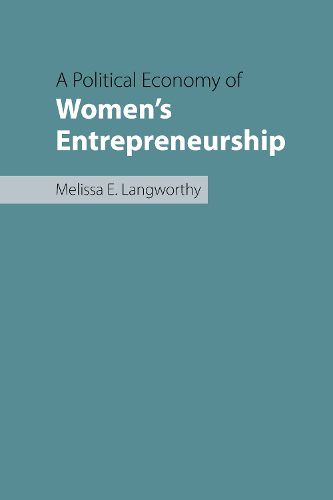Readings Newsletter
Become a Readings Member to make your shopping experience even easier.
Sign in or sign up for free!
You’re not far away from qualifying for FREE standard shipping within Australia
You’ve qualified for FREE standard shipping within Australia
The cart is loading…






The promotion of women's entrepreneurship has travelled globally in recent years and has been regarded as a relatively unquestioned good. It has been adopted as a tool for governments, policy-makers, and development professionals and applied to women in various political, economic and social contexts. Specifically, the focus on women's enterprises by international organizations, such as the World Bank, has established women's enterprise promotion as a signifier of modern and cosmopolitan economies. As such, there is an important need to discuss the outcomes of the various applications of women's enterprise promotion and to offer a political economy of women's entrepreneurship.
Moving beyond the input-output perspectives that have consistently positioned female entrepreneurs as underperforming relative to their male counterparts, this book argues that the universally distinctive experiences of women entrepreneurs are indicative of the need for a political economy of entrepreneurship, especially at the level of the household. Drawing from country-specific research, the book highlights the gaps between rhetoric and practice by policy-makers and programme designers promoting women's entrepreneurship. Furthermore, the analysis begins to close the conceptual gaps around the economic and social outcomes of entrepreneurship for women and establishes a foundation from which to build entrepreneurship theory and to strengthen enterprise programmes and policies.
$9.00 standard shipping within Australia
FREE standard shipping within Australia for orders over $100.00
Express & International shipping calculated at checkout
The promotion of women's entrepreneurship has travelled globally in recent years and has been regarded as a relatively unquestioned good. It has been adopted as a tool for governments, policy-makers, and development professionals and applied to women in various political, economic and social contexts. Specifically, the focus on women's enterprises by international organizations, such as the World Bank, has established women's enterprise promotion as a signifier of modern and cosmopolitan economies. As such, there is an important need to discuss the outcomes of the various applications of women's enterprise promotion and to offer a political economy of women's entrepreneurship.
Moving beyond the input-output perspectives that have consistently positioned female entrepreneurs as underperforming relative to their male counterparts, this book argues that the universally distinctive experiences of women entrepreneurs are indicative of the need for a political economy of entrepreneurship, especially at the level of the household. Drawing from country-specific research, the book highlights the gaps between rhetoric and practice by policy-makers and programme designers promoting women's entrepreneurship. Furthermore, the analysis begins to close the conceptual gaps around the economic and social outcomes of entrepreneurship for women and establishes a foundation from which to build entrepreneurship theory and to strengthen enterprise programmes and policies.